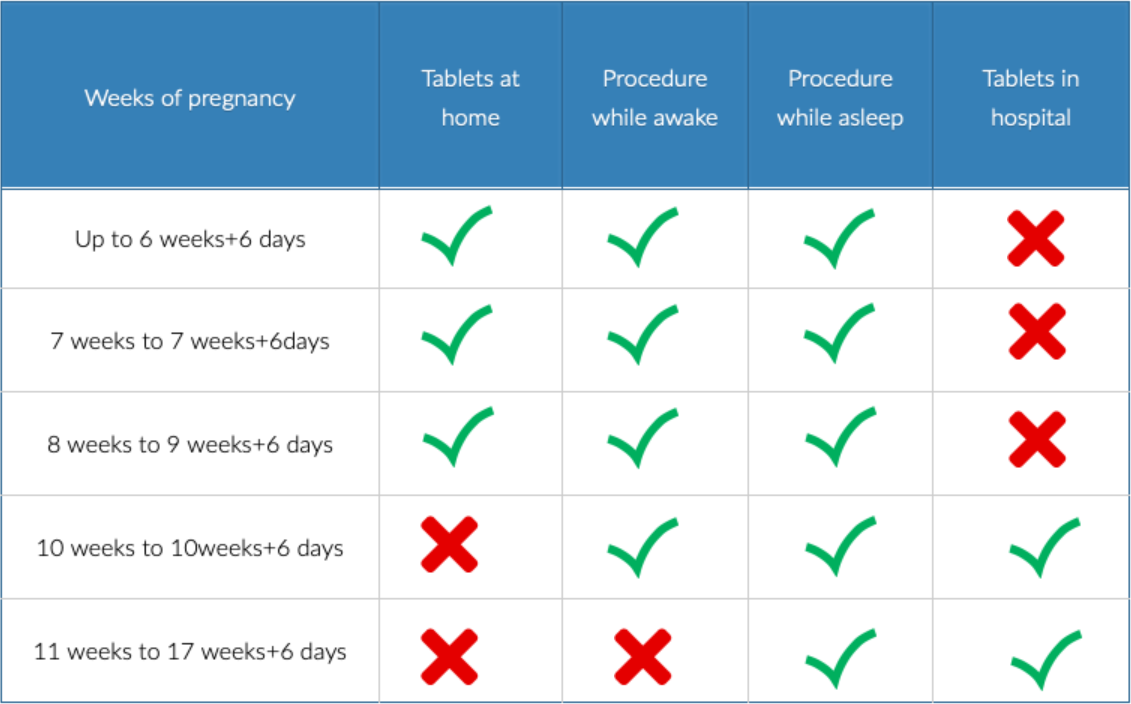Miscarriage - how to choose a treatment
There are THREE different miscarriage treatments:
We know that spending time making sure you choose the right treatment option for you is important, as it will ensure your experience of the treatment is as best as it can be. Deciding the right treatment option for you will depend on how many weeks into the pregnancy you are, any medical problems you have and your personal preference. Please remember that in some cases, the doctors and nurses may recommend a particular treatment for you, the below information is generalised, and doesn’t apply to all women.
To help you chose the right treatment option for you, we would suggest the following:
- Have a look at the first table – this shows what type of treatment is available based on how many weeks you are/think you are
- Compare these options using the information in the tabs below, to find the method which will suit you the best.
- Once you have decided which treatment you think you would like, please read the more detailed information on your chosen treatment, including what to expect before and during the treatment, and also the aftercare.
Please remember that when you have your assessment, there may be reasons which mean that the type of treatment you can have is restricted (based on medical problems etc). This information is just to give an idea of what treatments are available to you, but this will not be the case for every woman.
WHAT WILL HAPPEN?
Tablets
We give you 2 different medicines to bring on cramps and bleeding, to allow the pregnancy tissue to pass. The first tablet is taken in the clinic. Then:
Under 10 weeks - 1-2 days later you will insert vaginal tablets at home, at a time that suits you
Over 10 weeks - 1-2 days later you will return to hospital for admission, and the vaginal tablets will be inserted
Procedure while awake
You will be given vaginal tablets to soften the cervix (neck of the womb), 2-3 hours later, the doctor will apply numbing medications to the cervix, and the pregnancy will be removed by gentle suction.
Procedure while asleep
You will be given vaginal tablets to soften the cervix (neck of the womb), 2-3 hours later, you will have a general anaesthetic to put you to sleep. The doctor will remove the pregnancy through the cervix.
We give you 2 different medicines to bring on cramps and bleeding, to allow the pregnancy tissue to pass. The first tablet is taken in the clinic. Then:
Under 10 weeks - 1-2 days later you will insert vaginal tablets at home, at a time that suits you
Over 10 weeks - 1-2 days later you will return to hospital for admission, and the vaginal tablets will be inserted
Procedure while awake
You will be given vaginal tablets to soften the cervix (neck of the womb), 2-3 hours later, the doctor will apply numbing medications to the cervix, and the pregnancy will be removed by gentle suction.
Procedure while asleep
You will be given vaginal tablets to soften the cervix (neck of the womb), 2-3 hours later, you will have a general anaesthetic to put you to sleep. The doctor will remove the pregnancy through the cervix.
where will it happen?
Tablets
Under 10 weeks - At home
Over 10 weeks - On the hospital ward
Procedure while awake
Early Pregnancy Unit / Outpatients (occasionally in the Operating Theatre)
Procedure while asleep
Day treatment Unit and the Operating Theatre
Under 10 weeks - At home
Over 10 weeks - On the hospital ward
Procedure while awake
Early Pregnancy Unit / Outpatients (occasionally in the Operating Theatre)
Procedure while asleep
Day treatment Unit and the Operating Theatre
how long does it take?
Tablets
Under 10 weeks - The bleeding normally starts 1-4 hours after vaginal medicines and may be heavy for 2-5 hours.
Over 10 weeks - You will be in hospital for several hours, possibly the whole day. There is a small chance you may need to stay overnight
Procedure while awake
Time in hospital: 3-4 hours
Time for procedure: 10 minutes
Procedure while asleep
Time in hospital: 5-6 hours
Time for procedure: 10 minutes
Under 10 weeks - The bleeding normally starts 1-4 hours after vaginal medicines and may be heavy for 2-5 hours.
Over 10 weeks - You will be in hospital for several hours, possibly the whole day. There is a small chance you may need to stay overnight
Procedure while awake
Time in hospital: 3-4 hours
Time for procedure: 10 minutes
Procedure while asleep
Time in hospital: 5-6 hours
Time for procedure: 10 minutes
IS IT PAINFUL?
Tablets
Many women take paracetamol and ibuprofen to manage the pain, but you will be given stronger tablet pain relief in case you need it (codeine). Some women experience strong period pain, some describe labour type pain. The pain is normally increased the further into pregnancy you are. The pain normally lasts 2-5 hours.
Procedure while awake
You will have two forms of numbing medication (local anaesthetic) in the neck of the womb and strong tablet pain relief, to reduce the pain and discomfort. The strong cramps last during the procedure (around 10 minutes), but then settle quickly afterwards.
Procedure while asleep
You will have a general anaesthetic, so you will not have any pain during the procedure. You may experience mild cramps after the procedure
Many women take paracetamol and ibuprofen to manage the pain, but you will be given stronger tablet pain relief in case you need it (codeine). Some women experience strong period pain, some describe labour type pain. The pain is normally increased the further into pregnancy you are. The pain normally lasts 2-5 hours.
Procedure while awake
You will have two forms of numbing medication (local anaesthetic) in the neck of the womb and strong tablet pain relief, to reduce the pain and discomfort. The strong cramps last during the procedure (around 10 minutes), but then settle quickly afterwards.
Procedure while asleep
You will have a general anaesthetic, so you will not have any pain during the procedure. You may experience mild cramps after the procedure
WILL I BLEED?
Tablets
You will have heavy bleeding (more than a period), and you will pass clots (possibly up the size of a lemon). The bleeding will be heavier if you are further on in the pregnancy. This will settle after 2-5 hours and lessen as the days go on. It can take 2 weeks for the bleeding to stop, but some women will spot until their next period. Some women experience an episode of heavy bleeding 3-5 weeks after medication and/or their next period is heavier than normal.
Procedure while awake and asleep
There may be minor bleeding/spotting after the procedure for up to 2-3 weeks or until the next period. Some women find that their next period is heavier than normal.
You will have heavy bleeding (more than a period), and you will pass clots (possibly up the size of a lemon). The bleeding will be heavier if you are further on in the pregnancy. This will settle after 2-5 hours and lessen as the days go on. It can take 2 weeks for the bleeding to stop, but some women will spot until their next period. Some women experience an episode of heavy bleeding 3-5 weeks after medication and/or their next period is heavier than normal.
Procedure while awake and asleep
There may be minor bleeding/spotting after the procedure for up to 2-3 weeks or until the next period. Some women find that their next period is heavier than normal.
HOW WILL I FEEL?
Tablets
This option may be good for you if you would like less ‘intervention’, and would rather be in the comfort of your own home during the treatment. However, it is important to note that there is a chance you may see the pregnancy as it passes (especially at higher gestations), and for some women this can have an impact on their emotions.
Procedure while awake
This option may be good for you if you would rather stay awake during the procedure, but you want to ensure you will not see the pregnancy. For some women, the short procedure time is emotionally more favourable than a longer process with tablets.
Procedure while asleep
This option may be good for you if you would rather not be aware of the treatment at all. For some women it is important for their emotions that they have no memory of the procedure and they wake up when the treatment is complete.
We have a counsellor available to all women for support after their treatment. Please let us know if you would like an appointment.
This option may be good for you if you would like less ‘intervention’, and would rather be in the comfort of your own home during the treatment. However, it is important to note that there is a chance you may see the pregnancy as it passes (especially at higher gestations), and for some women this can have an impact on their emotions.
Procedure while awake
This option may be good for you if you would rather stay awake during the procedure, but you want to ensure you will not see the pregnancy. For some women, the short procedure time is emotionally more favourable than a longer process with tablets.
Procedure while asleep
This option may be good for you if you would rather not be aware of the treatment at all. For some women it is important for their emotions that they have no memory of the procedure and they wake up when the treatment is complete.
We have a counsellor available to all women for support after their treatment. Please let us know if you would like an appointment.
CAN I HAVE SOMEONE WITH ME?
Tablets
Under 10 weeks - We recommend you have someone at home with you
Over 10 weeks - You may have one person with you on the ward
Procedure while awake
You can bring someone with you. They will be able to sit with you before and after the procedure, but will not be present for the procedure itself
Procedure while asleep
You will not be able to have anyone with you while you are in hospital. You will need someone to pick you up after the procedure and someone must be with you for the 24 hours afterwards
Under 10 weeks - We recommend you have someone at home with you
Over 10 weeks - You may have one person with you on the ward
Procedure while awake
You can bring someone with you. They will be able to sit with you before and after the procedure, but will not be present for the procedure itself
Procedure while asleep
You will not be able to have anyone with you while you are in hospital. You will need someone to pick you up after the procedure and someone must be with you for the 24 hours afterwards
CAN I EAT AND DRINK? CAN I DRIVE?
Tablets
You may eat and drink what you want, and drive when you feel able to
Procedure while awake
You may eat and drink what you want, and drive when you feel able to
Procedure while asleep
You will need to fast for 6 hours before the time of your procedure. You cannot drive for 48 hours after the procedure
You may eat and drink what you want, and drive when you feel able to
Procedure while awake
You may eat and drink what you want, and drive when you feel able to
Procedure while asleep
You will need to fast for 6 hours before the time of your procedure. You cannot drive for 48 hours after the procedure
WHAT CONTRACEPTION CAN I HAVE?
If you would like contraception, we can arrange this for you.
Tablets
You can have all forms of contraception started at the time apart from copper or ‘Mirena’ coil, which will be fitted 3-4 weeks after your treatment
Procedure while awake and asleep
You can have all forms of contraception started at the time, including having a copper or ‘Mirena’ coil fitted during the treatment
Tablets
You can have all forms of contraception started at the time apart from copper or ‘Mirena’ coil, which will be fitted 3-4 weeks after your treatment
Procedure while awake and asleep
You can have all forms of contraception started at the time, including having a copper or ‘Mirena’ coil fitted during the treatment




